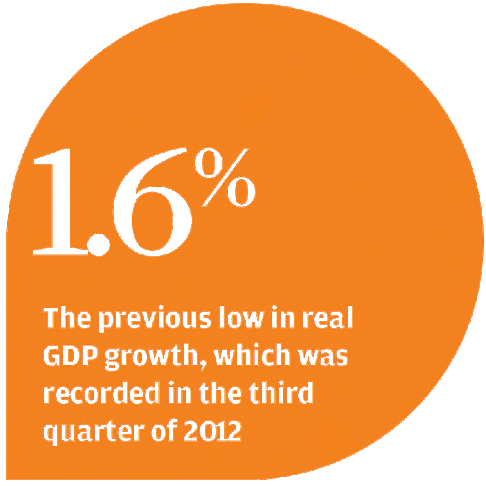
Hong Kong’s economic growth in first quarter slowest since 2012
Snowstorms in US caused drop in exports in first two months of the year
Economic growth slowed to 2.5 per cent year-on-year in the first quarter - the worst since 2012 - due to sluggish goods exports, the government economist says.
This was the smallest growth in gross domestic product in real terms recorded in a quarter since the 2012 European debt crisis, which saw real GDP growth of just 1.6 per cent in the third quarter of that year, Helen Chan said yesterday.

Growth recorded in the previous quarter was 2.9 per cent.
But the government expected improvement, keeping its 2014 forecast of a real GDP growth rate of 3 to 4 per cent.
"Q1 performance was slightly worse than expected due to weak exports. But there was a rebound in March," Chan said.
Total goods exports slowed to just 0.5 per cent growth in the first quarter, as trade with advanced economies slackened sharply because of bad weather.
Exports of goods to the United States, which was troubled by snowstorms, fell 2 per cent in the first two months. But they bounced back to 15.8 per cent growth in March.
Chan was optimistic despite slower growth in the first quarter. With global exports picking up, she expected improvement in the rest of the year.
"If economies in the US and Europe are revived as expected, hopefully they will trigger growth in Asia as well," she said. Within the domestic market, growth in private consumption expenditure also slowed, to 2 per cent.
Chan said this was mainly because the Easter holiday, during which people usually spend more, was in the second quarter this year instead of the first.
Rising tension between mainland tourists and locals had also sparked concerns in the retail industry, which relies on tourists for a third of their sales.
The number of mainland tourists who came to the city during the three-day Labour Day holiday fell for the first time this year since 2008. Chan said that up until last month, arrivals were still seeing double-digit growth.
"I hope there won't be a major slowdown in tourism," she said. "It … supports the employment of more than 200,000 people," she said.
Meanwhile, the unemployment rate edged down to a 16-year low of 3.1 per cent in the first quarter, from 3.2 per cent in the previous quarter.
As for the property market, the government proposed last week that a tough anti-speculation measure introduced last year which doubles stamp duty on some property transactions may be relaxed.
Under existing arrangements, buyers who sell their old homes within six months of buying a new one would be eligible for a refund. The government has recently proposed extending this period by one to two months.
Chan said she could not find much basis for loosening the market-cooling measure any further than that.
Although flat prices had fallen slightly from a year ago, people were still spending more than half their income on mortgages, she said. The 20-year average mortgage payment to income ratio was about 47 per cent from 1994 to 2013, while the latest ratio was 56 per cent.
"The property market has cooled down a bit, but the risk of a bubble remains," Chan said.
